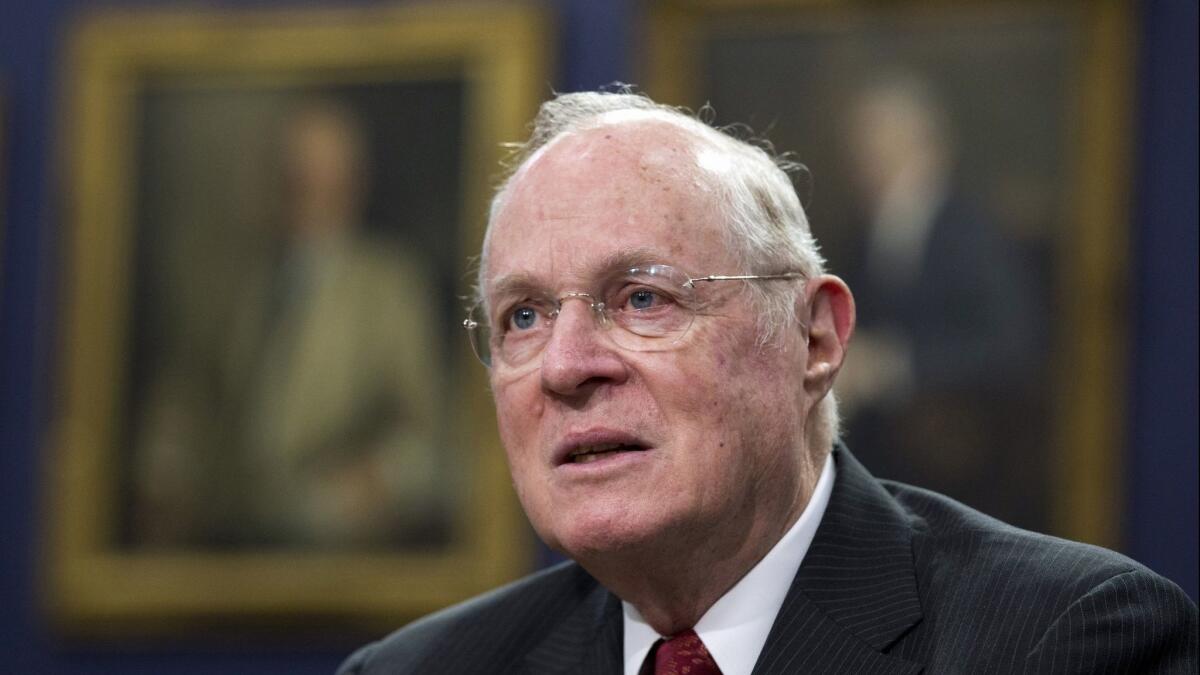Op-Ed: Actually, Kennedyâs Masterpiece Cakeshop opinion doesnât conflict with his gay rights legacy

Something looks awry about the Supreme Courtâs 7-2 decision in one of the most closely watched cases of the term, Masterpiece Cakeshop vs. Colorado Civil Rights Commission.
The court, in an opinion authored by Justice Anthony M. Kennedy, reversed a Colorado decision that compelled a baker to make custom cakes for same-sex marriages. Kennedyâs opinion might be read as a victory for those who object to gay unions.
Wait a minute. Can this be the same Justice Kennedy who has made a lasting legacy for himself with rulings recognizing the rights of same-sex partners in a series of landmark decisions? Did the avatar of same-sex constitutional protections have a late-career fundamental change of heart?
The answer is no, and in fact Kennedyâs opinion for the court, carefully read, is very much of a piece with his four prior opinions in support of equal treatment for gays and lesbians.
The basics of Masterpiece Cakeshop are these: Lakewood, Colo., baker Jack Phillips protested that being forced to create a cake for a same-sex wedding would violate the 1st Amendment in two ways: It would transgress his right of free expression because it would carry an artistic message with which he disagreed, and it would violate the free exercise of religion because he disagreed with the message on religious grounds.
In his opinion, Kennedy calls out the âdifficultâ and âdelicateâ question of how to reconcile two apparently competing freedoms: the nondiscrimination principle policed by the Colorado Civil Rights Commission and the freedom of religion and speech claims of the baker.
The high courtâs reversal is narrow, procedural, fact-bound. It in no way disparages the constitutional liberties of same-sex couples.
Kennedyâs language makes clear that each side is entitled âto the neutral and respectful consideration.â The flaw in the commissionâs decision, and the reason for the reversal, is evidence in the record that the commissioners addressed the claims of the baker with narrow-mindedness and even scorn: A commissioner opined that freedom of religion has been used historically to justify discrimination. âAnd to me,â he said, âit is one of the most despicable pieces of rhetoric that people can use.â
Kennedy, as well as Justice Elena Kagan in her concurring opinion, focused on this excess to find that the Colorado Civil Rights Commission âwas neither tolerant nor respectful of Phillipsâ religious beliefsâ; it failed to accord âfull and fair consideration to his religious beliefs.â
The high courtâs reversal is narrow, procedural, fact-bound. It in no way disparages the constitutional liberties of same-sex couples. In fact, the decisionâs legal analysis begins with the ringing declaration that âour society has come to a recognition that gay persons and gay couples cannot be treated as social outcasts or inferior in dignity or worth.â
One way of analyzing the courtâs approach is that it permitted seven justices with disparate substantive views about free exercise of religion and freedom of expression to come to some sort of conclusion about an exceedingly difficult case.
Thatâs not inaccurate. But itâs also true that Kennedyâs opinion reads the Constitution as incorporating a principle of fair play and civility. Advocates who fail this test of civic virtue may find that the court wonât even address their substantive concerns.
This ideal of common respect and treatment of warring stakeholders as equals fits well with the rest of Kennedyâs judicial legacy. It forms part of the foundation of his earlier decisions that came down on the side of gay plaintiffs.
There is something of Atticus Finch in Kennedy. He is the son of a small-town lawyer who took over his fatherâs legal practice before being elevated to the court of appeals at age 39. He has built his constitutional jurisprudence atop a platform of personal decency based on the idea that even the bitterest political disputes can be fought civilly.
Some might find off-putting, even condescending, this sort of civics lessons coming in the form of Supreme Court opinions. The courtâs job, after all, is to interpret the law. (One imagines the ghost of Justice Antonin Scalia writing a biting dissent mocking Kennedyâs piety, goading the court to decide the legal issues once and for all and keep its trap shut about civic values and the worth of both sides of the case.)
Yet itâs worth comparing Kennedyâs, and the courtâs, decision-making in this case with that of the political sphere in the Trump era. The political branches of government are supposed to work together, debate civilly and arrive at tolerable compromises. They arenât working that way right now, however.
The Masterpiece Cakeshop decision â consensus-driven, limited, respectful of competing sides â seems the antithesis of the polarizing, slash-and-burn approach of our politics, right down to the fact that the court has done its job of resolving a dispute, while the House and Senate mostly fight bitterly to no end.
Masterpiece Cakeshop vs. Colorado Civil Rights Commission leaves to another day broad constitutional questions, but it resolves the case before it, keeps the peace and points the way forward for compromise among bitter opponents. A fair and characteristic outcome for the âKennedy court.â
Harry Litman, a former United States attorney and deputy assistant attorney general, teaches constitutional law at UC San Diego. He clerked for Justice Anthony M. Kennedy during the 1988-89 Supreme Court term.
Follow the Opinion section on Twitter @latimesopinionand Facebook
More to Read
A cure for the common opinion
Get thought-provoking perspectives with our weekly newsletter.
You may occasionally receive promotional content from the Los Angeles Times.










